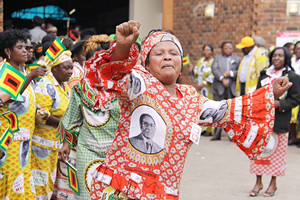
Women rally at the ZANU-PF National People's Conference held in Bulawayo. The revolutionary party and founder of modern Zimbabwe is preparing for elections in 2013., a photo by Pan-African News Wire File Photos on Flickr.
Saluting Zimbabwe’s revolutionary women
Friday, 19 April 2013 00:00
Gender Forum Ruth Butaumocho
Zimbabwe Herald
Thousands of Zimbabweans across the political divide yesterday put aside their political differences and joined hands to celebrate Zimbabwe’s Independence that came after a protracted struggle with the colonial regime. The event that was commemorated in every town and city across the country was marked by pomp and fanfare as thousands of people took time to remember the lives of thousands of sons and daughters that were lost during the liberation struggle while trying to defend the sovereignty of this nation.
There are, however, others who came out of the battle alive but bruised and disabled for life — physically and psychologically — and will for the rest of their lives, live with the unforgettable memories of the battlefield which brought about the Independence that we enjoy today.
It is, however, folly and sheer malice for those who failed to recognise the day as a national event, arguing that independence celebrations were nothing but solely a Zanu-PF commemoration. That attitude smacks of sheer hypocrisy and clearly demonstrates how some individuals have stooped so low to allow partisan politics to rule their lives at the expense of national interests.
If anything, such thinking or utterances should be discouraged at all costs because it demeans and trivialises issues of national importance at a time the country is working hard towards instilling a sense of nationalism and patriotism to the younger generation.
One of the survivors of the liberation struggle said, the participation of both men and women in the war was a sure sign of unity of purpose, since they were all driven by the same ideologies and the need to be liberated from the colonial clutches, reigning supreme during that time.
A former detainee and one of the women who were actively involved in the struggle for Independence, 78-year-old Jane Ngwenya, said there were thousands of men and women of virtue, who bore the brunt of the war, who still with the scars of the torrid time they endured during the pre-Independence period.
She said they went to the war as a united front, more so women, who have always been brought together largely by the challenges that affront them socially and economically.
During the liberation struggle, the battle was a double-edged sword, especially to women, who were in the trenches dodging bullets and faced several other challenges, that ranged from shortage of basics like sanitary wear and shortage of food at times.
For those who were in detention, some had to serve their terms together with their young children, who also had to endure the hardships together with their mothers. Some of the children were not as fortunate as they died following a series of disease outbreaks owing to the inhabitable conditions they survived under.
Although the issue of sanitary wear might appear as trivial and a luxury, Ms Ngwenya, who was detained at Gonakudzingwa from 1964 to 1971, together with the likes of prominent nationalists Cde Ruth Chinamano and Mai Mungoma, said these were quite critical basics that women needed to have.
However, the challenges which were part of the colonialist’s strategy to demoralise the masses so that they could give up the fight, further strengthened the detainees and guerillas to remain resolute in their quest to liberate the country.
Looking back, Ms Ngwenya said despite the problems that women faced and some of the gruelling challenges they came across particularly for those who were in the battlefield, alongside men, they soldiered on and did not allow partisan politics to divide them.
Quite often you hear our mothers talking about the all-night pungwes they attended together with vana mukoma, the endless trips they would make to the mountains with food meant for freedom fighters strapped on their backs, never mind the all night laundry vigils to wash those corduroys, tender foots, and the heavy combat to ensure that the liberation struggle would proceed smoothly.
All this and other activities were part of women’s contribution towards the liberation of the country, which again did not give room for partisan politics.
It is the same spirit that needs to prevail if women are to prosper economically as well as politically. It will definitely work in their favour if women, for once were to put their political differences aside and at least speak with one voice and further promote their interests.
Instead of hinging on partisan politics for their survival and ascendancy, women should be able to define their space, demand a stake in the empowerment vehicle as one voice, start campaigning for gendered leadership, while mentoring each other.
Yes, success stories of women empowerment in different sectors of society have been recorded here and there, but sadly on the whole, the plight of women continues unabated across the social spectrum.
The situation is telling.
While the struggle for gender parity in politics is gaining momentum, albeit at a snail’s pace, other areas like, equal economic participation and equal opportunities at work and other sectors continue to lag behind. Women should work hard to fill that vacuum rather than being bogged down to partisan politics, which at the end of the day will not translate much towards women empowerment.
Sometimes winning is not all about the agility and dexterity that you exhibit when fighting your opponent, but it is all about choosing the battle.
No comments:
Post a Comment